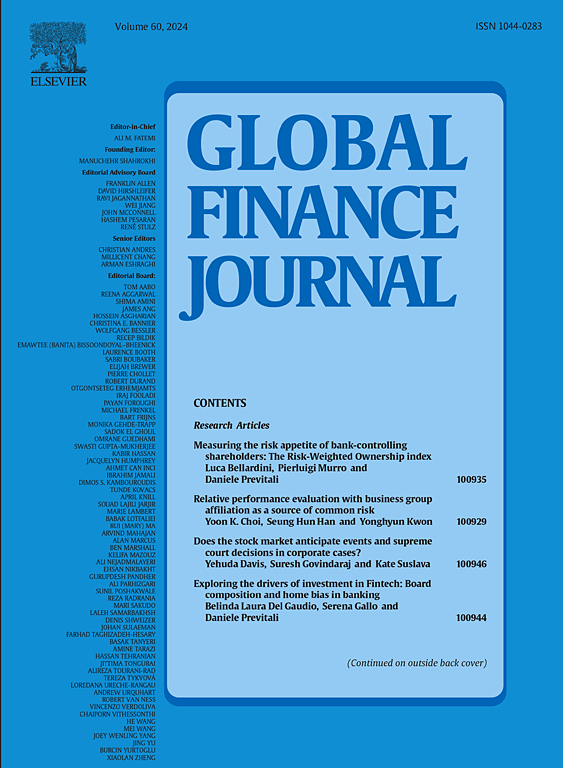所有权集中与股权交易:拉丁美洲背景下控股股东在公司绩效中的矛盾角色
IF 5.5
2区 经济学
Q1 BUSINESS, FINANCE
引用次数: 0
摘要
本研究旨在检验Jensen和Meckling在其经典的外部股权代理成本理论中所描述的公司治理机制,研究对象为拥有大量公司股份的控股股东为特征的拉美公司。我们的发现与理论一致:股权集中度使控股股东对其公司具有重大影响力,使他们能够在出售股票或发行新股时降低代理成本,因为他们的利益与外部股东的利益一致。更高的市场估值和更好的投资业绩证明了这一点。然而,我们也发现,由于利益不一致,这种影响使得控股股东在增加持股或回购股票时采取机会主义行为,从而对公司绩效产生不利影响。因此,高持股为控股股东提供了影响力,但这种影响力对绩效的影响是积极的还是消极的,取决于股权交易的具体背景。本文对股权集中的矛盾作用有了新的认识,为在制度薄弱的市场中改善监督和监管提供了相关见解。本文章由计算机程序翻译,如有差异,请以英文原文为准。
Ownership concentration and equity transactions: The ambivalent role of controlling shareholders in firm performance in Latin American contexts
This study aims to test a corporate governance mechanism described by Jensen and Meckling in their classic theory of the agency costs of outside equity, focusing on Latin American companies characterized by controlling shareholders who own a large percentage of their firms' shares. Our findings align with the theory: Ownership concentration gives controlling shareholders significant influence over their firms, enabling them to reduce agency costs when selling shares or issuing new equity, as their interests align with those of outside shareholders. Higher market valuations and better investment performance evidence this. However, we also find that this influence allows controlling shareholders to act opportunistically when increasing their ownership stakes or during stock repurchases, as interests are not aligned, leading to adverse effects on firm performance. Thus, high ownership stakes provide controlling shareholders with influence, but whether this influence positively or negatively impacts performance depends on the specific context of equity transactions. This paper sheds new light on the ambivalent role of ownership concentration, offering insights relevant to improving monitoring and regulation in markets with weak institutions.
求助全文
通过发布文献求助,成功后即可免费获取论文全文。
去求助
来源期刊

Global Finance Journal
BUSINESS, FINANCE-
CiteScore
7.30
自引率
13.50%
发文量
106
审稿时长
53 days
期刊介绍:
Global Finance Journal provides a forum for the exchange of ideas and techniques among academicians and practitioners and, thereby, advances applied research in global financial management. Global Finance Journal publishes original, creative, scholarly research that integrates theory and practice and addresses a readership in both business and academia. Articles reflecting pragmatic research are sought in areas such as financial management, investment, banking and financial services, accounting, and taxation. Global Finance Journal welcomes contributions from scholars in both the business and academic community and encourages collaborative research from this broad base worldwide.
 求助内容:
求助内容: 应助结果提醒方式:
应助结果提醒方式:


